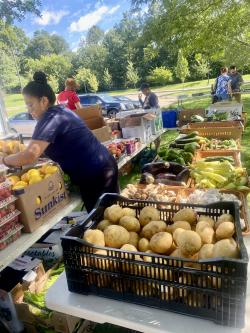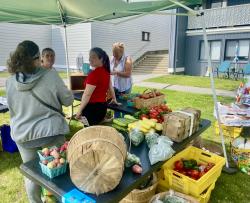PSE Program — News

PSE Office:
UMass Extension
SNAP-ED Multi-level Specialist
UMass Amherst at Mount Ida
100 Carlson Ave
Miller Building #22
Newton , MA 02459
Contact:
Kathy Cunningham, MEd, RD, LDN
kcunningham@umext.umass.edu
413-406-6456
Massachusetts Mobile Farmers’ Markets Partnerships Increase SNAP Participants’ Access to Fruit and Vegetable Incentive Program
“I was never able to use my HIP benefit before!” — Plymouth resident with disabilities
Partnerships between mobile farmers’ markets, the UMass Extension Nutrition Education’s SNAP Ed Program (NEP) and community organizations made it possible for SNAP participants to access fresh healthy produce at their homes, schools, educational centers, and councils on aging. For many SNAP participants, it was the first opportunity for them to use their fruit and vegetable benefit provided through the Healthy Incentive program (HIP). Depending on the household size, this benefit offers $40, $60 or $80 extra dollars per month to purchase fruits and vegetables.
 Challenge
Challenge
Many SNAP participants cited lack of transportation as a barrier to reaching farmer’s markets. Housebound seniors lacked access and people with disabilities had concerns about walking around at a traditional farmers’ market and carrying home bulky bags of produce. These challenges resulted in participants not utilizing their HIP benefits for fruits and vegetables. Also in some locations, farmers with HIP processing capabilities reported difficulty reaching SNAP recipients in various locations.
Solution
These challenges presented an excellent policy, systems and environmental (PSE) opportunity for NEP’s southeast region to partner with Patti’s Patch Farm, local public and private low-income housing authorities, councils on aging, and food distribution organizations to bring colorful mobile farmers’ markets to the doorsteps of underserved SNAP participants. SNAP participants can now participate in the joyful atmosphere of a fresh produce market where they live and learn and can use their HIP benefits there. In 2023, monthly markets in Plymouth and Wareham rang up more than 1,250 HIP purchases which totaled approximately $38,000 in redemptions. In Brockton, the Saturday school markets had more than 360 HIP purchases and averaged $14,400 in redemptions each month. Participants look forward to purchasing local produce such as kale, collard greens, potatoes, tomatoes, carrots, cantaloupes, apples, and berries. In addition, the farmer’s provide tropical produce such as yams, cassavas, yucas, callaloos, mangoes, bananas, and pineapples, and Asian produce such as bok choy and daikon radishes.
“Thank you so much for bringing the farmers’ market to our neighborhood! I could never make it to the downtown market.” — Brockton community member
At these markets, NEP nutrition educators offered delicious food samples, healthy recipes, and reusable ‘MyPlate’ shopping bags. The community atmosphere inspired participants to socialize and interact. They reminisced about growing food with their parents and grandparents as children, shared favorite family dishes they like to cook, and delighted in the farmers’ market experience. Children also enjoyed the energetic market atmosphere and were invited by nutrition educators to participate in learning and physical activities. The “My Plate” bean bag toss was a favorite, as were the farmer’s market scavenger hunt, and physical activities such as hula-hooping and jumping rope.
For 2024, NEP is looking forward to building partnerships with additional farmers and community organizations statewide who share the goal of connecting SNAP participants with the opportunity to access fresh fruits and vegetables where they live, learn, and play. The need for additional markets is profound. Each market we participated in generated a request for another market at a new location. The value of mobile farmers’ markets is two-fold: they improve SNAP participants' access to healthy fresh produce, and they provide opportunities for local farmers to bring their produce to SNAP participants who can use their HIP benefits and keep SNAP dollars in the local food system. A bonus is that farmers’ markets also provide space for valuable social experiences with community members of all ages.
“It gives me great satisfaction to provide healthy produce to this generation.” — Farmer Patti
